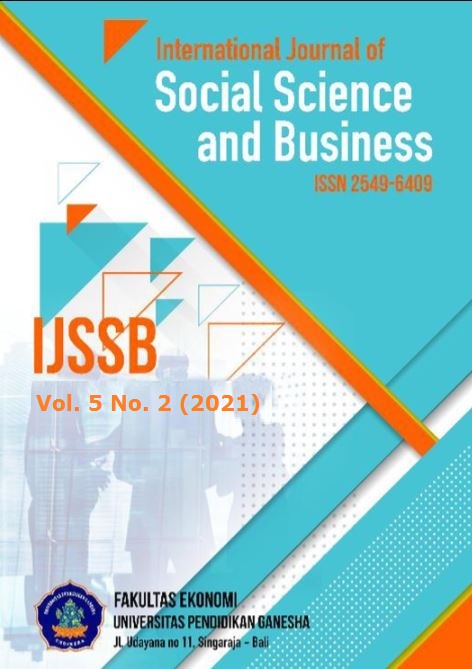Blockholder Ownership Impact on the Related Party Transactions to the Financial Industries
DOI:
https://doi.org/10.23887/ijssb.v5i2.35605Keywords:
Blockholder Ownership, Related Party Transactions, TunnellingAbstract
Research on the impact of ownership structure on related party transactions carried out by companies gives varied results. Moreover, this research still rarely uses a sample of the financial industry in Indonesia. So, the study aimed to find out block holder ownership effect on tunnelling or propping related party transactions in financial industries in Indonesia. Sample research were 82 financial industries that listed in Indonesian Stock Exchange in 2017-2019 with 246 observations as panel data. Based on panel data regression test, this study found block holder ownership had positive effects on tunnelling related party transactions that proxied by related party transactions related to accounts receivable and related party transactions related to assets other than account receivables. Meanwhile, blockholder ownership had no effect on propping related party transactions that proxied by related party transactions related to accounts payable and liabilities other than accounts payable. The study also found blockholder ownership effect on tunnelling related party transactions was bigger than propping. These findings were appropriate with the relevant agency theory about blockholder ownership effect on related party transactions which had the potency on the emergence of agency conflict among the shareholders.
References
Agustinah, R., Sumarno, M., & Mubarok, A. (2019). Pengaruh Corporate Governance, Struktur Kepemilikan, Hak Arus Kas, Dan Disclosure of Rpt Terhadap Transaksi Pihak Berelasi. Multiplier: Jurnal Magister Manajemen, 2(2), 91–109. https://doi.org/10.24905/mlt.v2i2.1294.
Bona-Sánchez, C., Fernández-Senra, C. L., & Pérez-Alemán, J. (2017). Related-party Transactions, Dominant Owners and Firm Value. BRQ Business Research Quarterly, 20(1), 4–17. https://doi.org/10.1016/j.brq.2016.07.002.
Brundy, E. P., & Siswantaya, I. G. (2014). Pengaruh Mekanisme Pengawasan Terhadap Aktivitas Tunneling. E-Journal UAJY, 1–15. http://e-journal.uajy.ac.id/5624/1/Jurnal Ilmiah - Edwin.pdf.
Cheung, Y. L., Jing, L., Lu, T., Rau, P. R., & Stouraitis, A. (2009). Tunneling and propping up: An analysis of related party transactions by Chinese listed companies. Pacific Basin Finance Journal, 17(3), 372–393. https://doi.org/10.1016/j.pacfin.2008.10.001.
Dewi, N. A. C. (2010). Faktor-Faktor yang Mempengaruhi Praktik Ekspropriasi di Indonesia. Jurnal Ilmiah Mahasiswa FEB, 3(1). https://jimfeb.ub.ac.id/index.php/jimfeb/article/view/1404.
Friedman, E., Johnson, S., & Mitton, T. (2003). Propping and tunneling. Journal of Comparative Economics, 31(4), 732–750. https://doi.org/10.1016/j.jce.2003.08.004.
Helena, R., & Firmansyah, A. (2018). Pengungkapan Pihak-Pihak Berelasi pada Perusahaan-Perusahaan Salim Group yang Terdaftar di Bursa Efek Indonesia. Jurnal Online Insan Akuntan, 3(2), 185–196. http://www.ejournal-binainsani.ac.id/index.php/JOIA/article/view/1035.
Herliana, V. (2018). Pengaruh Praktik Corporate Governance Terhadap Besaran Transaksi Pihak Berelasi Dan Kinerja Keuangan Perusahaan. AKUNESA: Jurnal Akuntansi Dan Keuangan, 7(1), 1–20. https://core.ac.uk/download/pdf/230771075.pdf.
Islam, M. R. (2018). Sample size and its role in Central Limit Theorem (CLT). International Journal of Physics and Mathematics, 4(1), 37–47. https://doi.org/10.31295/pm.v1n1.42.
Kosmaryati, K., Handayani, C. A., Isfahani, R. N., & Widodo, E. (2019). Faktor-Faktor yang Mempengaruhi Kriminalitas di Indonesia Tahun 2011-2016 dengan Regresi Data Panel. Indonesian Journal of Applied Statistics, 2(1), 10. https://doi.org/10.13057/ijas.v2i1.27932.
Pangesti, N. G., & Hidayat, W. (2019). Konsentrasi Kepemilikan, Transaksi Pihak Berelasi, dan Kinerja Perusahaan. E-Jurnal Akuntansi, 29(2), 592. https://doi.org/10.24843/eja.2019.v29.i02.p08.
Sari, R. C., Fatimah, P. L. R., & Djajadikerta, H. G. (2016). Development of Tunneling Detection Model: A New Corporate Performance Improvement. Jurnal Pengurusan, 48(2016), 33–46. https://doi.org/10.17576/pengurusan-2016-48-03.
Sun, P., Hu, H. W., & Hillman, A. J. (2016). The Dark Side of Board Political Capital: Enabling Blockholder Rent Appropriation. Academy of Management Journal, 59(5), 1801–1822. https://doi.org/10.5465/amj.2014.0425.
Supatmi. (2020). Pengaruh Transaksi Pihak Berelasi Terhadap Kinerja Perusahaan dengan Koneksi Politik Sebagai Pemoderasi. Universitas Brawijaya.
Supatmi, Sutrisno, T., Saraswati, E., & Purnomosidhi, B. (2019). The effect of related party transactions on firm performance: The moderating role of political connection in indonesian banking. Business: Theory and Practice, 20(2003), 81–92. https://doi.org/10.3846/BTP.2019.08.
Tambunan, M. E., Siregar, H., Manurung, A. H., & Priyarsono, D. S. (2013). Transaksi Afiliasi, Grup Bisnis, Pemegang Saham Ultimat, Tata Kelola Perusahaan Yang Baik, Rasio Utang Terhadap Modal.
Utama, C. A. (2015). Penentu Besaran Transaksi Pihak Berelasi: Tata Kelola, Tingkat Pengungkapan, dan Struktur Kepemilikan. Jurnal Akuntansi Dan Keuangan Indonesia, 11(1), 37–54. https://doi.org/10.21002/jaki.2015.03.
Villalonga, B., & Amit, R. (2006). How do Family Ownership, Control and Management Affect Firm Value? Journal of Financial Economics, 80(2), 385–417. https://doi.org/10.1016/j.jfineco.2004.12.005.
Winarno, W. W. (2015). Analisis ekonometrika dan statistika dengan eviews. UPP STIM YKPN.
Yeh, Y. H., Shu, P. G., & Su, Y. H. (2012). Related-party transactions and corporate governance: The evidence from the Taiwan stock market. Pacific Basin Finance Journal, 20(5), 755–776. https://doi.org/10.1016/j.pacfin.2012.02.003.











